"As much as we guitarists love to solo, 90% of guitar in most music is rhythm playing so it’s essential you're good at it" – UK session guitarist Ryan Robinson talks advice, tone and why he built an Eddie Van Halen Frankenstrat tribute
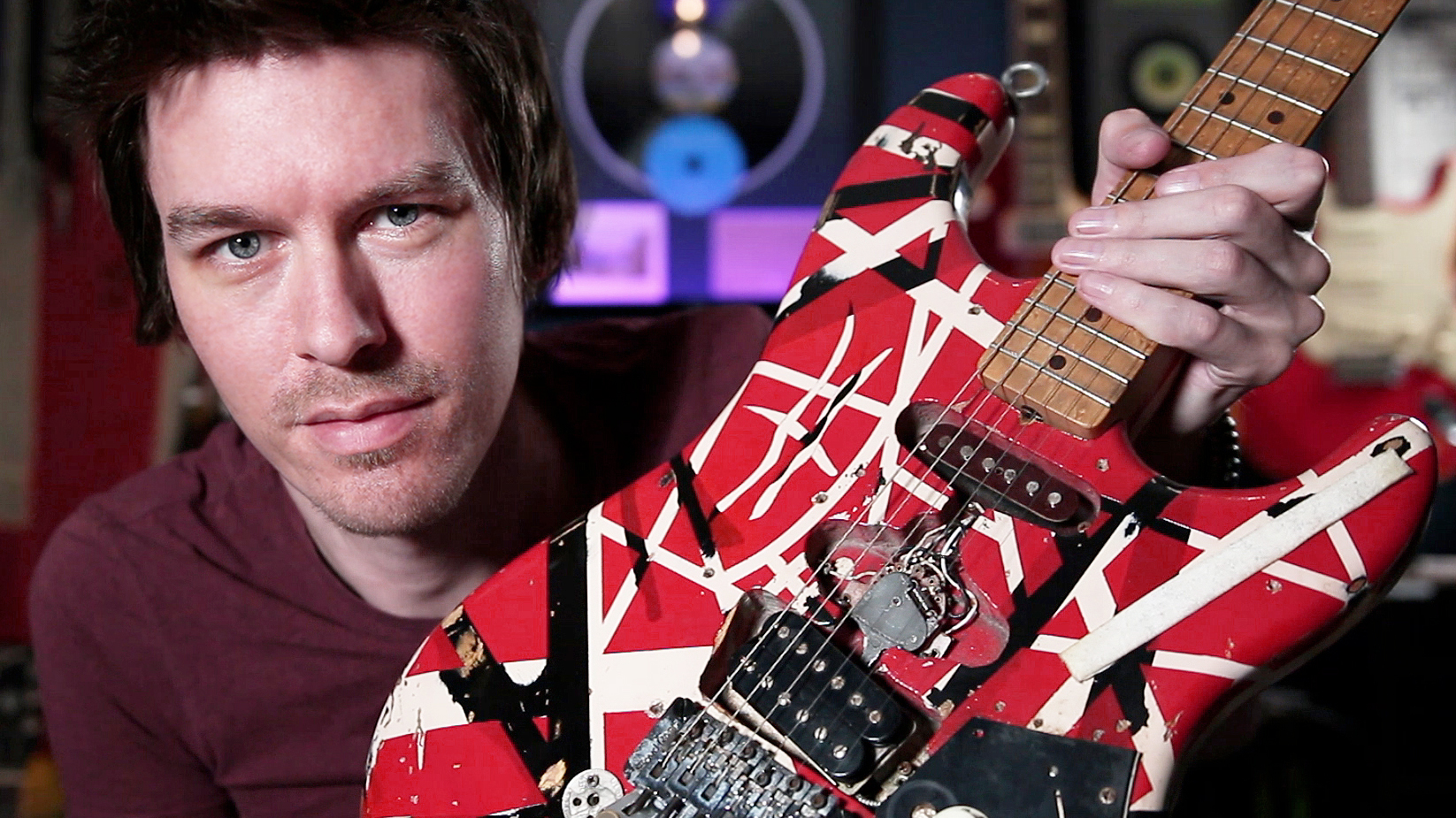
Want all the hottest music and gear news, reviews, deals, features and more, direct to your inbox? Sign up here.
You are now subscribed
Your newsletter sign-up was successful
The idea of making a living from playing guitar sounds like a bit of a dream to many of us, but what is the reality of being a pro session guitarist these days? In a changing industry, the work can be as hard as it is rewarding but the best person to ask to get real insight is obviously someone out there doing it.
UK musician Ryan Robinson is the ideal candidate. With 20 years experience playing guitar in a wide variety of scenarios, he's got a wealth of experience to share about how multi-faceted a musician needs to be to make a living from live, recording and remote sessions.
And he loves his gear too; that Eddie Van Halen tribute Frankenstrat he's holding above – he put that together, and played Eruption on it so well, YouTube incorrectly recognised it as the original. More on that below!
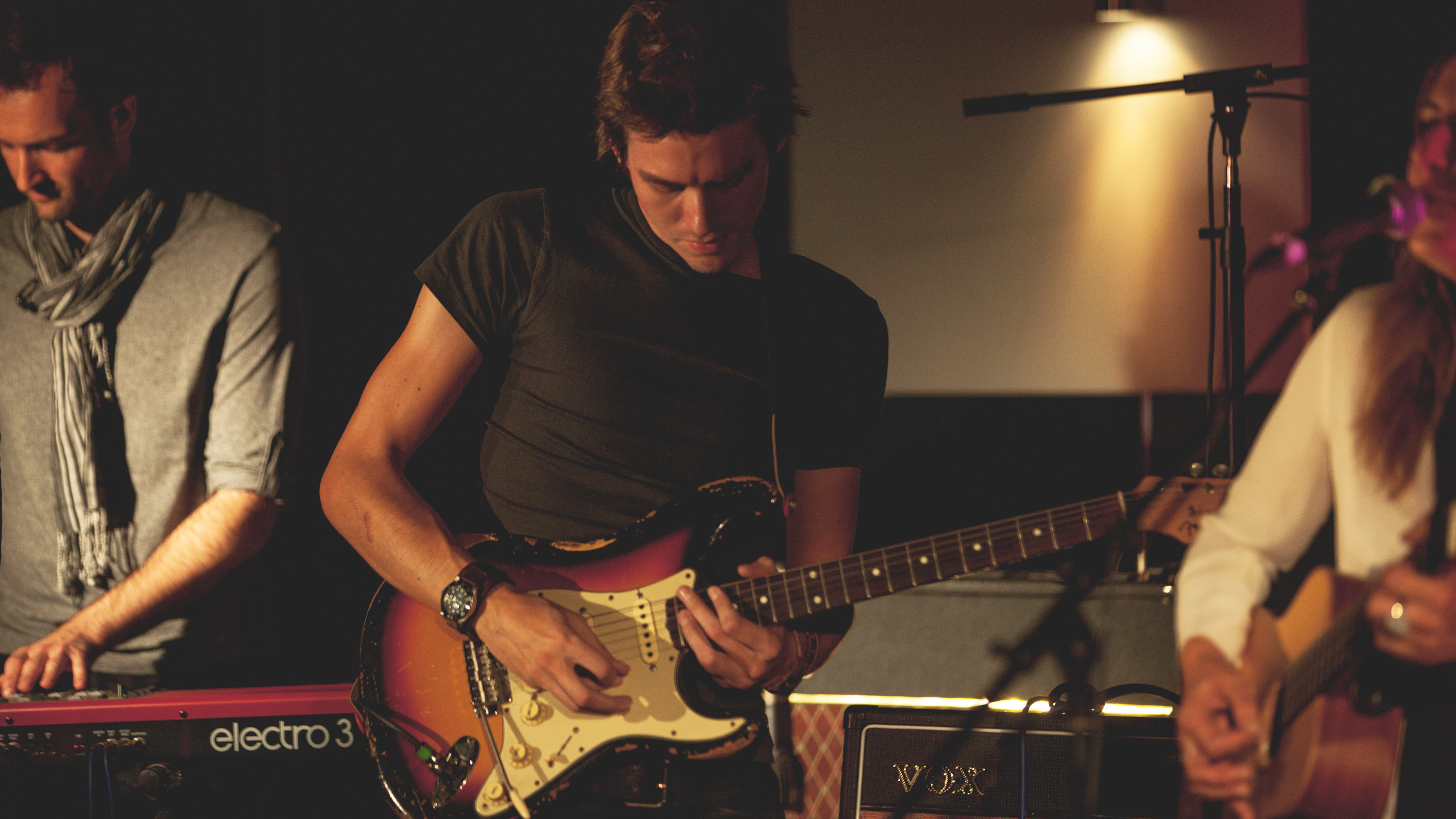
Who inspired you to play guitar in the beginning?
"Richie Sambora of Bon Jovi was my first real inspiration. I’d always been surrounded by music since a young age (I remember listening to my parent’s Sting / The Police cassettes on loop in the car) but when I was about 12 my parents took me to see Bon Jovi at Wembley Stadium.
"It was the first concert I’d ever been to and the last at the original Wembley before they tore it down to build the new one. It was a real life-changing experience for me, I distinctly remember laying in bed at home that night with my ears ringing and thinking “I want to play guitar".
When did you decide to pursue a career as a session guitarist? Was there a moment that prompted it?
Want all the hottest music and gear news, reviews, deals, features and more, direct to your inbox? Sign up here.
"For the first few years playing guitar was just a hobby as before that I’d aways thought I’d have a career in art. I played in a band with some friends at school for fun and we were asked to play an open evening event to promote the music department.
"We played a Muse cover and a couple of original songs (all instrumental) and the following day a friend of mine told me her dad had said I should pursue playing guitar as a career. Before that I’d never considered music as a realistic career choice but having someone else say it like that somehow flicked a switch and I thought, okay, I’ll do that. Even then I somehow knew I wanted to pursue a career as a session player rather than trying to make it in a band or as a solo artist."
I started doing little recording jobs – things like writing music for film student friends' short films or acoustic sessions accompanying singers, just anything I could to build up a body of work
How did you start finding gigs and what were the kind of playing jobs you were taking in the beginning?
"After school I went to study music at college and was lucky to have some really supportive tutors. One in particular took me under his wing and just as I was getting to the end of my course he asked if I might be interested in covering some gigs for him over the summer. It was just pub gigs and weddings but they were my first real paid gigs and those led to more with different bands.
"I then spent the next few years playing gigs with everyone I could to build up experience and contacts while studying my degree. A lot of it was functions band work but I eventually started playing with original artists too. I also started doing little recording jobs – things like writing music for film student friends' short films or acoustic sessions accompanying singers, just anything I could to build up a body of work.
"Eventually the more I did the higher profile the gigs and sessions became, it just sort of progressed naturally over time."
How did you become part of Nick Heyward’s band?
"It sounds like such a cliché but it really was just a case of being in the right place at the right time with the right contacts. I’d been playing a few gigs with a functions band and the drummer (my good friend Dan Western) was musical director of Nick’s band at the time.
"For his final performance on his music degree Dan had decided to play a Nick Heyward medley, so he asked me to come and play and got Nick to come in and sing. Both being guitarists Nick and I chatted about our mutual love of funky rhythm guitar and Nile Rodgers and we exchanged numbers, and he must’ve liked my playing as when he next needed a guitarist I got the call."
What are your highlights of working with him so far?
"There have been many, but I remember playing this one festival on the same day that England were playing in the World Cup. Our stage time was right after the match (which they won) and so when we hit the stage the positive energy in the crowd was electric. Nick started singing Football’s Coming Home and even though none of us in the band had ever played it before we somehow managed to all join in in the same key and play a few choruses before starting the set.
"That was a really amazing gig. I actually recorded some of it using my Snapchat Spectacles, the video is on YouTube [see above]. The other that sticks out is definitely The Cavern Club in Liverpool. Obviously there’s The Beatles connection but even without that there’s a certain vibe in Liverpool you just don’t get anywhere else. The people are so friendly and the atmosphere is amazing. I think that’s probably still the best gig I’ve ever played.
"Nick is such a great guy to work for, I really love playing with him."
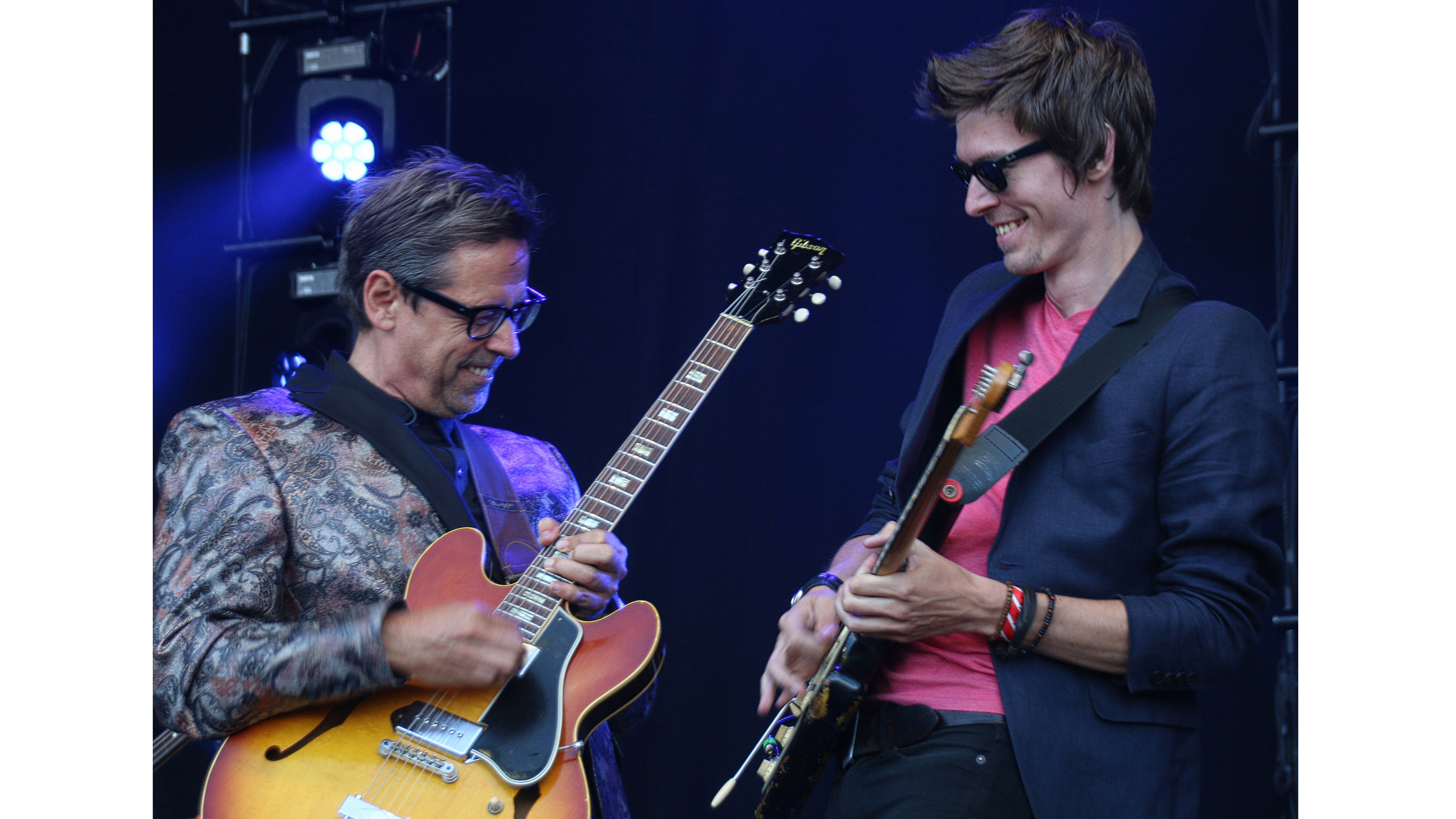
I still do sessions in person, but in most circumstances an online session can get the same job done more efficiently and at a much lower cost
What different kind of playing services can you offer and have you noticed a growth in demand for online playing services?
"I do live work when the opportunity comes up but recently I've been doing a lot of online sessions. It’s amazing what we can do with technology now, I’ve recorded for clients based all around the world.
"I’ve done a lot of work recently for a brilliant composer in Switzerland (Yannick Zenhäusern) recording guitar for some video game projects and we’d never have been able to collaborate without the internet, it really opens up the possibilities of working with anyone. I’d always offered online sessions even before the pandemic but it's definitely helped in normalising remote working over the last couple of years – I’ve moved all of my teaching online now too.
"Of course I still do sessions in person, but in most circumstances an online session can get the same job done more efficiently and at a much lower cost. Without having to travel you can keep costs down and you have all your equipment set up and ready to go. I also find I can work a lot faster recording myself too.
I’ve been given some pretty impossible parts before and had to do things like changing tunings to make it work
What are the biggest challenges for a session guitarist?
"I think the biggest challenge is in being prepared for every eventuality and seamlessly slipping into different roles. You could be recording some Spanish nylon string guitar one day and then a solo in the style of Angus Young the next, so you need to be able to switch between those playing styles on demand as well as having the relevant equipment.
"Sometimes the parts you have to play can be pretty challenging too. I read a brilliant quote in Vic Flick's (the guitarist who played guitar on the James Bond theme's) book that said, "as a session player you're either bored to death, or scared to death" and I think that’s pretty accurate.
"This is especially true when parts have been written by a piano player as they can forget guitarists can’t play the same way they can. I’ve been given some pretty impossible parts before and had to do things like changing tunings to make it work, but composers are generally pretty accommodating at letting you change things to make it playable on guitar."
Being able to actually make a living from it is really hard work
There’s a lot involved in terms of managing and promoting yourself, while staying versatile as a musician – do you think there are any misconceptions about the life of a session player?
I think people think it’s glamorous and you just show up and play guitar but there's a lot more to it than that.
"Being able to actually make a living from it is really hard work. It’s not the sort of job you can just apply for so not only do you have to be a good guitarist but you also have to be your own manager, promoter, booking agent etc.
"There are also the other aspects of the job people forget about. For one gig or session there are hours of preparation beforehand (not to mention the hundreds of thousands of hours you’ve spent to get to a professional playing level in the first place) and then there’s the hours of driving, hanging around before and after you play – playing guitar is just the tip of the iceberg.
"It’s also not the most financially secure profession. Just because you sometimes play on big stages acting like a rock star it doesn’t mean you’re earning rock star money. There’s a great meme that says a musician is a person who loads £5000 worth of equipment into a £500 car to drive 100 miles for a £50 gig and (although that may be an exaggeration) there’s certainly a lot of truth to it. It’s definitely not the sort of job you do for the money, you have to do it because you love it."
I’m currently thinking about getting a Quad Cortex as the idea of having all of my amps captured in one box would be incredibly convenient for session work
How has it informed your rig choices? Are there any particular pedals and guitars that provide the best versatility for you?
"It’s useful to have one of all the main types of guitar (Les Paul, Strat, Telecaster etc) but I play with a lot of Strats as they are really versatile and can cover most styles. I have a DiMarzio Virtual Solo stacked humbucker in the bridge position for the thicker rock tones and Mark Foley single-coil pickups for the neck and middle and that gives me virtually everything I need.
"One of my main guitars is actually a sub-$100 Saga 'build you own guitar' kit I built and painted with my Dad when I was 13. That guitar has been used on countless recording sessions, festival stages and even at The Royal Albert Hall so it’s come a long way from being painted on a coat hanger in the garage! I’ve also been playing my Gibson SG Standard a lot since I bought it a few years ago.
"I have a few different amps I like to use. I mainly use my Mesa/Boogie Lonestar (which seems to sound great for everything) but I also have a Vox AC30, Marshall 1987X and JTM45. I’m currently thinking about getting a Quad Cortex as the idea of having all of my amps captured in one box would be incredibly convenient for session work (and from the samples I’ve heard it sounds almost indistinguishable from the real thing).
"I’m also a real pedal geek and have collected A LOT of them over the years. I used to have a huge spaceship of a pedalboard but in the last few years I’ve really been downsizing and now pretty much just use a compressor, overdrive, wah/volume, delay, and a tuner. I had something of an epiphany a few years ago where I started plugging my SG straight into my Marshall and found it so liberating to play without effects, it also really improved my playing."
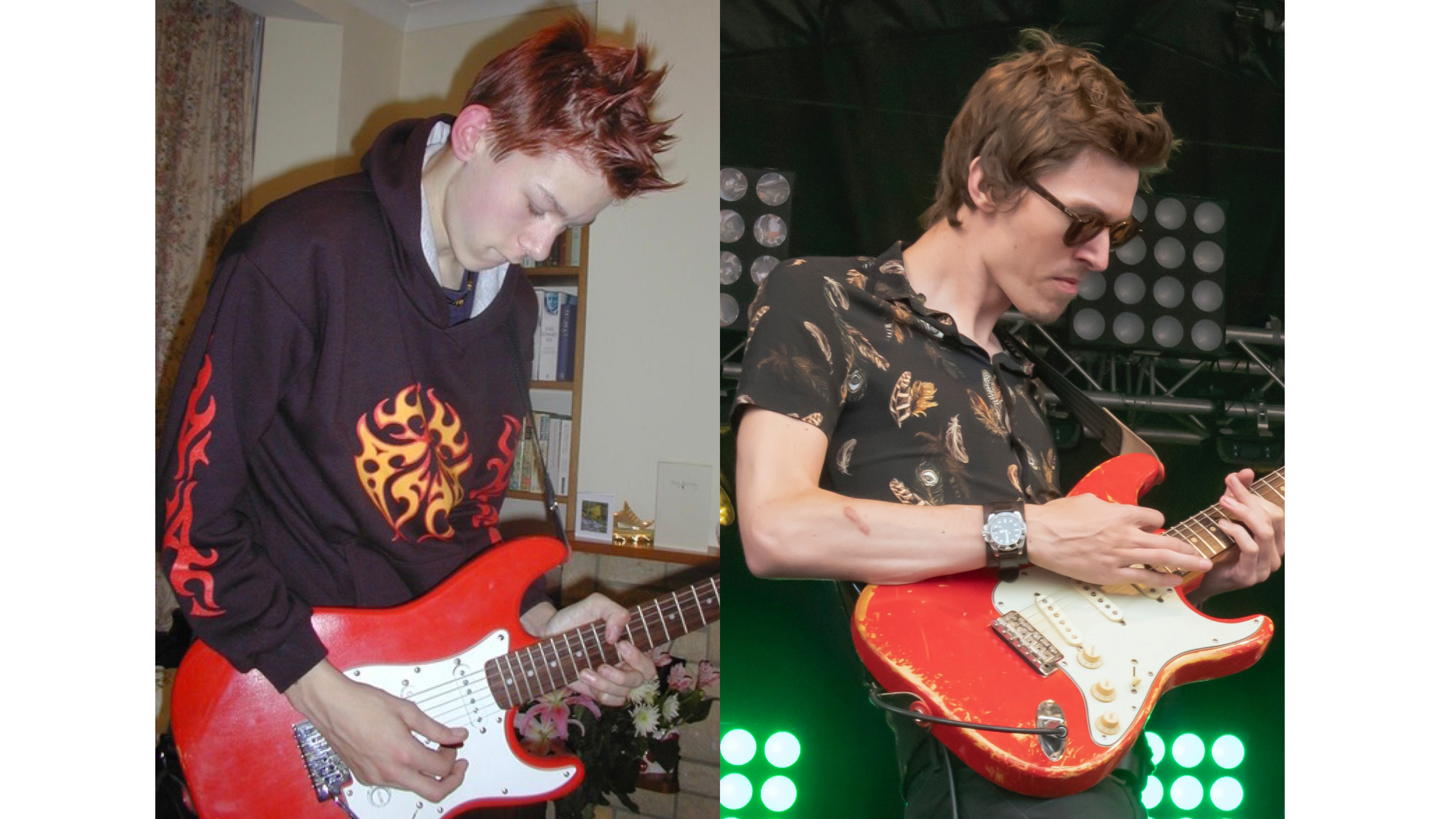
Sometimes the sound can be just as much about the production and recording as the playing itself
What kind of recording skills does a session player need and did your music education help with giving you a grounding with that?
I think it’s really important to not only be able to play well but also be a good recording engineer and producer, especially if you’re doing remote sessions and recording yourself. You need to know your way around Logic and be able to work fast without hunting through menus. Learning basic skills like mic placement is really important too.
"Of course 9 times out of 10 putting an SM57 in front of a cab will get the job done, but sometimes the sound can be just as much about the production and recording as the playing itself. I once recorded a track in the style of Led Zeppelin and in order to replicate the tone I had my small Vox practice amp at one end of a room mic'd with a SM57 and a condenser mic around 15 feet away to capture the room ambience. On its own the close mic wouldn’t have given the right sort of sound but combined with the room mic it sounded exactly like those early Zeppelin recordings, so it’s useful to have that kind of knowledge.
"Nowadays there are loads of resources and YouTube videos teaching this kind of thing but I've learnt a lot from experience and working with different producers and engineers. Oli Heyward (Nick’s son) is an amazing audio engineer and I’ve learnt a lot working with him. He recorded the best guitar sound I’ve ever had for the song Perfect Sunday Sun on Nick’s last album.
I put in a lot of effort into making my lessons relevant to my students' individual tastes and teaching them what they want to learn
You’re a guitar teacher too, what do you think are the most important traits in a good guitar teacher?
"It’s important to try and make learning fun and interesting for your students. I put in a lot of effort into making my lessons relevant to my students' individual tastes and teaching them what they want to learn. When I first started playing I tried having some lessons at school but the guitar teacher just wanted to teach me nursery rhymes from sheet music (and as a 13 year old I just wanted to learn Led Zeppelin!) so I quit pretty quickly and taught myself.
"Now whenever I get new students I always ask them to write me a list of their favourite songs/artists so I can try and include them as much as possible. If you give them boring exercises or music they don’t like they won’t want to practice and will give up pretty quickly, but if you give them a song they really like then they are much more likely to want to practice it.
"It’s also really important that you’re able to communicate things in an easy to understand way to your students. Just because you can play it doesn’t make you a good teacher so being able to break it down and explain things in a way they can understand is really important. Teaching online has really helped with that as I can show tab or notation on screen to demonstrate things a lot easier.
Are there any songs that keep coming up as requests from students?
"You always get the usual suspects - Smoke On The Water, Smells Like Teen Spirit, Seven Nation Army etc. I teach students from as young as 12 to 60+ and it’s interesting how a lot of the requests overlap. Modern artists like Ed Sheeran and Billie Eilish get requested quite a bit now too. I’ve also been getting a lot of requests from some of my younger students for the sort of music I listened to when I was their age like Sum 41, Blink 182 and Limp Bizkit. It’s been a real nostalgia trip revisiting those songs!
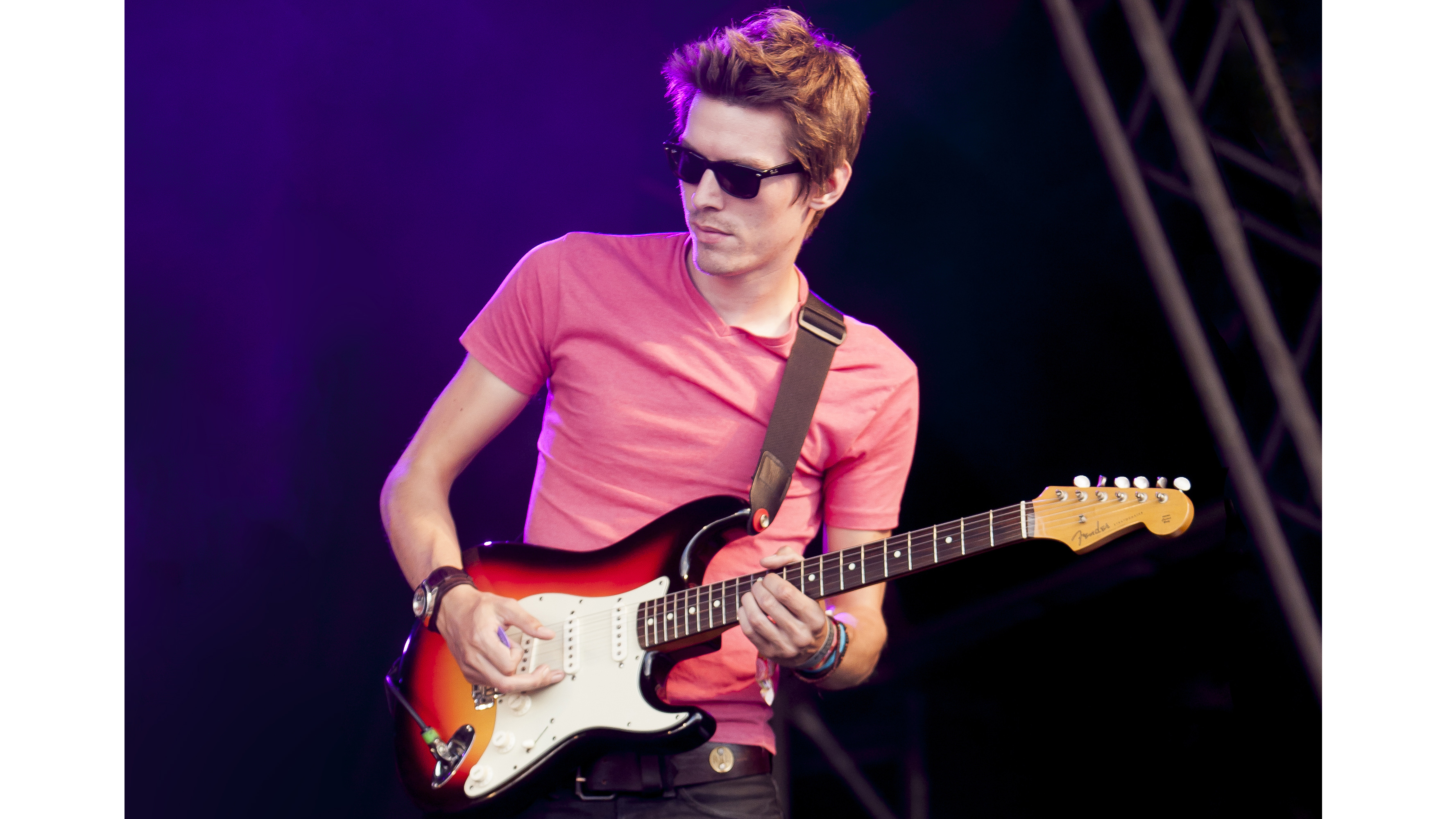
Do you feel that teaching guitar has actually benefited your own playing in any way?
"Teaching has definitely improved my playing a huge amount. Having to go through things over and over really embeds it in your memory - you know your CAGED system pretty well after you’ve taught it to 50 students!
"Teaching also gets you to think about certain things in ways you may never have done before. There are things I might have been able to just play without thinking about it before but in order to teach it to someone you really have to break it down and work out what’s actually going on. I’ve learnt a lot through having to do that with things I can already play. I’ve also gotten really fast at transcribing with writing out songs for my students, it’s really good practice for your ear."
I did some remote recording for a video game soundtrack which involved me having to record three variations of every part, each completely different so the game could dynamically change between them depending on what was going on
You have been involved in soundtracks too – including the theme for the BBC children’s show Biff & Chip. How does the process usual work with those kind of contributions and do you get much creative input?
"The way it works depends on the person and the project. A lot of the time the composer will send me the guitar part as demo audio using samples or MIDI and I just have to replicate it, I can work things out by ear really quickly.
"In the case of Biff & Chip I was actually originally hired to play ukulele. The composer (Mark Russell) had written the parts already and I just had to play them. He’s always very open to me contributing my own ideas though so I did then add some electric guitar parts of my own too.
"Funnily enough the ukulele part was cut before it was broadcast and only my electric guitar parts stayed! In contrast. other jobs can be very free and almost completely up to me to create parts. I did some remote recording for a video game soundtrack which involved me having to record three variations of every part, each completely different so the game could dynamically change between them depending on what was going on. That was all very improvisational and I could play pretty much anything I wanted."
I thought that if I were going to do it then I might as well go all the way, so as a result the project ended up turning from a couple of weeks into nine months!
The Frankenstrat tribute guitar you built a couple of years ago is really impressive, what sparked the idea to do it and what were the biggest challenges?
"Thanks! One of my specialities as a player is in replicating other player’s tones and styles and sometimes (like a method actor) I find having the right guitar can help me get in the zone to play that way. I’d also always been a fan of Eddie Van Halen and have always tinkered with guitars (a lot of my guitars are ones I’ve put together myself) so I thought it might be a fun project build over a few weekends.
"I bought a body and was just about to get started when by complete chance the real Frankenstrat went on display at The Met in New York and hundreds of super detailed photographs began to surface online. At that point I thought that if I were going to do it then I might as well go all the way, so as a result the project ended up turning from a couple of weeks into nine months! I really went down the rabbit hole trying to make it as accurate as possible - from replicating the wear and scratches, gaffer tape residue, broken screws, tangled wires, cigarette burns etc.
"It was surprisingly difficult to get all the different stripes right as they all intersect with each other, so you might start in the right place for one stripe but by the time it’s gone over to the other side of the body it’s in the wrong place. I ended up having to sand it all off and start all over again a couple of times. Finding the right shade of red was also a challenge as the paint most people use is only available in the US, I must have bought five or six different cans before settling on the one I used. Some of the parts are getting increasingly difficult to find too, like the Schaller crown tuners and Cortina truck reflectors."
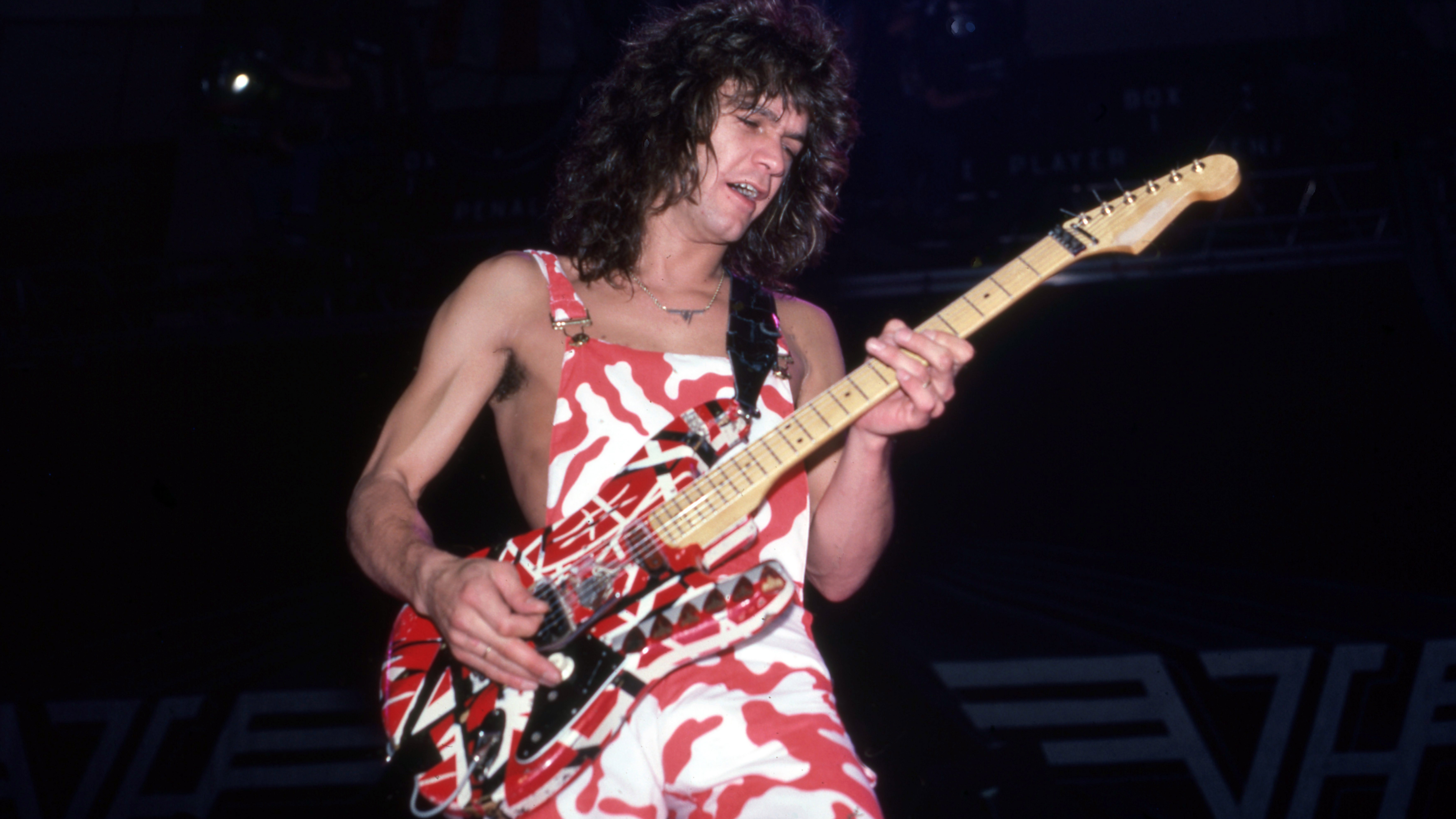
I’d always known Eddie was an amazing player but now I see him as an innovator on a par with Les Paul
Did you discover anything that surprised you about Eddie’s tone in the process?
"Eddie's tone was actually relatively simple in terms of gear (I’m planning on making a video soon to show how I replicated it) but the thing that building my replica really showed me was just how much of an innovator he was. Most people just think of him as the guy who popularised tapping but there was so much more to him than that.
"The whole guitar is a monument to his ingenuity. Things like putting a Gibson humbucker into a Fender, wax potting his own pickups, making his own strap locks with DIY-store screw eyes, blocking off the tremolo with a quarter screwed into the body, being an early adopter of the Floyd Rose and suggesting the addition of fine tuners – the whole guitar is full of innovations and experiments to get the sound and performance he wanted out of it.
"I’d always known Eddie was an amazing player but now I see him as an innovator on a par with Les Paul."
Do you have any tips for learning Eruption?
I’d give the same tip I always give my students for learning any song - don’t take transcriptions literally or try and copy them note for note. It’s much better to learn the overall 'outline' of parts and then interpret them your own way. That way you'll end up with a much more fluid, musical sounding result rather than something that sounds robotic.
"I tell my students it would be like learning how to recite lines from a play but agonising over the pronunciation of every single syllable of every line. It’s much better just learning the lines and then doing your own performance. My Eruption cover is certainly not note for note (even though YouTube seems to recognise it as the original!) and if you listen to recordings of Eddie playing it live he never played it exactly the same way twice either."
What are your future aims as a musician – are there any specific ambitions you’d like to realise?
"I’m really fortunate to have a job that I love so I hope to keep doing more TV, film and video game work. There are some really great TV and game composers doing amazing work so I’m always looking to expand my client-base and work with new people. Obviously it’s finished now but I was a huge fan of Peaky Blinders and would love to work on a show like that if the opportunity presented itself. The music (and guitar in particular) was such an integral part of the whole feel of the show.
"Playing live I’m very lucky to have done some of my main bucket list venues already (The Cavern Club, Royal Albert Hall) but I’ve still got Wembley Stadium on my to-do list. That would be a really meaningful one as that’s where it all began for me.
Ryan's 5 top tips for becoming a session guitarist
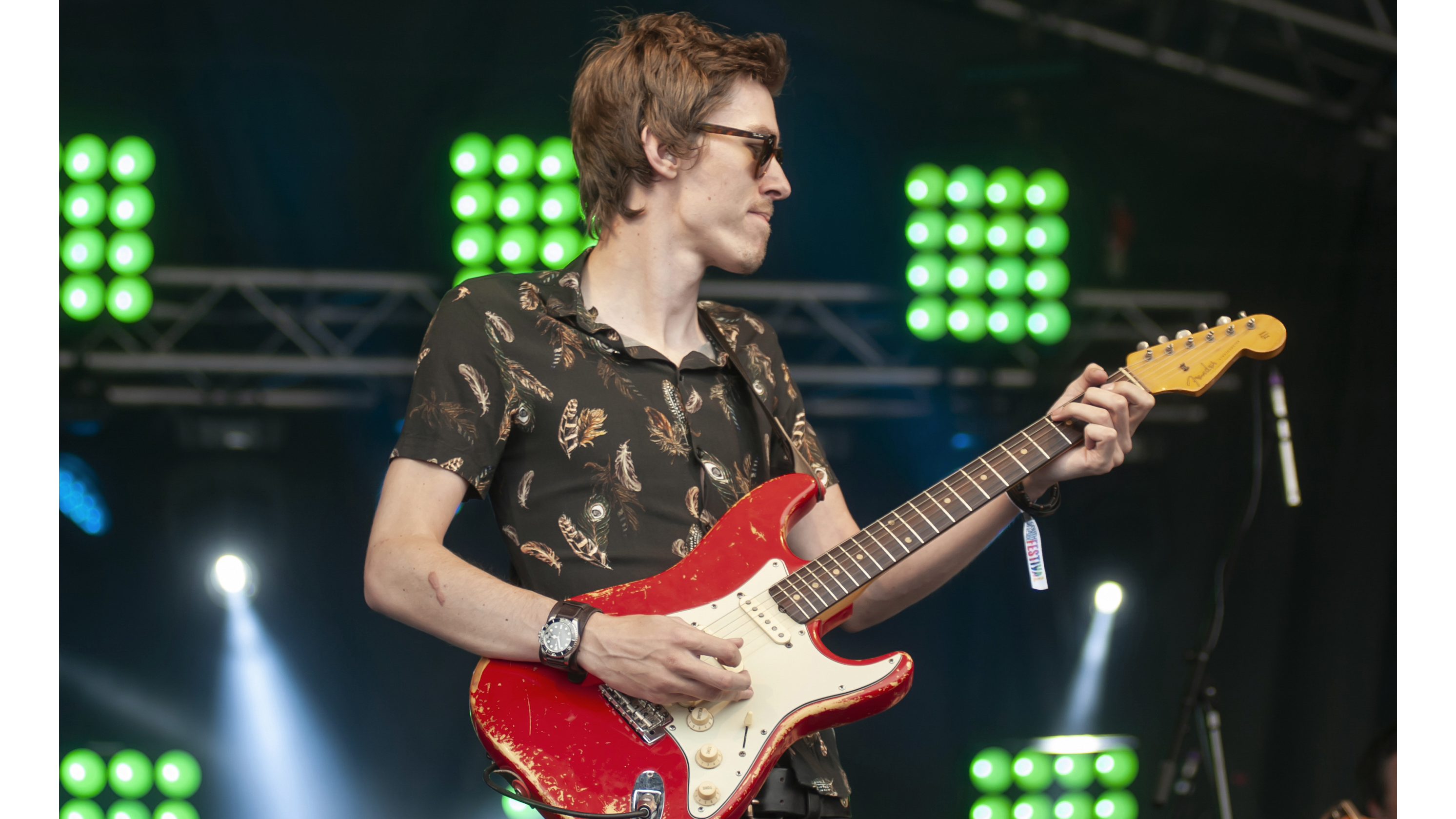
It takes a lot of hard work and persistence to build up a reputation but eventually it pays off
1. Absorb as much music as you can regardless of your own personal tastes
"If you’re into metal learn some reggae, country or funk and get a basic understanding of what playing in each style involves. It’s great to master one style but versatility is what makes you a much more valuable session player.
2. Get good at playing rhythm guitar
"As much as we guitarists love to solo, 90% of guitar in most music is rhythm playing so it’s essential you're good at it.:
3. Don’t expect immediate success
"It takes a lot of hard work and persistence to build up a reputation but eventually it pays off. Just be professional, easy to work with, and obviously play well and you should get called back to work again."
4. When starting out consider doing certain jobs for favours or at a reduced rate
"Obviously don’t let yourself be taken advantage of (and ensure you weigh up the potential benefits to you for doing it) but sometimes it can be worth it to get your foot in the door or get something impressive on your CV. When I was first starting I did a few of these kind of jobs and they can often lead to better paid work down the line.
5. Finally, don’t be afraid to send an email to people you’d like to work with
"I’ve got a lot of regular work over the years from people I’ve just e-mailed on the off-chance. The worst that could happen is you get no reply, and the best is that you get something great out of it."
For more info on Ryan check out:
www.ryanrobinsonguitarist.co.uk
YouTube
Instagram
Twitter
Facebook

Rob is the Reviews Editor for GuitarWorld.com and MusicRadar guitars, so spends most of his waking hours (and beyond) thinking about and trying the latest gear while making sure our reviews team is giving you thorough and honest tests of it. He's worked for guitar mags and sites as a writer and editor for nearly 20 years but still winces at the thought of restringing anything with a Floyd Rose.